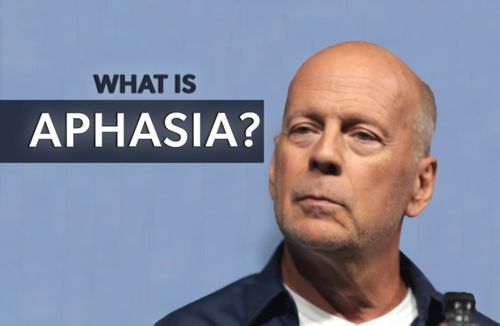What is aphasia and how is it so debilitating?
Apr 05, 2022 · 2 mins read
0
Share
After Bruce Willis' unexpected retirement announcement due to being diagnosed with aphasia, it caused many people to wonder what the debilitating condition is and learn about it for the first time. Aphasia is a type of brain damage that can be caused by stroke or head trauma.
Save
Share
Most notably, aphasia affects the parts of the brain which control speech, so understanding and formulating words can be significantly more difficult. This can range from the occasional inability to find a word, to total loss of the ability to communicate altogether.
Save
Share
Aphasia is not related to intelligence or motor skills. The impact on the ability to speak is not muscular or physical, but strictly cognitive. Aphasia can even be witnessed in deaf people who had primarily communicated via sign language but lose the ability to sign.
Save
Share
There are many types and classifications of aphasia. The two primary classifications are fluent (the ability to speak but the inability to understand others), and nonfluent (the total inability to speak or use more than a few words).
Save
Share
Approximately 2.2 million people have been diagnosed with aphasia in the U.S. & U.K. Each year over 180,000 are diagnosed with it in the U.S. It is not age dependent, however since stroke is the leading cause of aphasia, most people diagnosed tend to be middle aged or older.
Save
Share
Symptoms of aphasia include the inability to: understand language, formulate words, enunciate, read, write, follow instructions, repeat a phrase. Signs of aphasia may also include speaking gibberish, persistent repetition of a word or syllable and substituting words or syllables.
Save
Share
There is no cure for aphasia, but therapy has been shown to help manage the symptoms and often regain some of the lost cognitive abilities. Therapy for aphasia includes naming objects on flash cards, repeating targeted words, using hand gestures for speech and more.
Save
Share
If symptoms last longer than 2-3 months following the stroke or brain trauma full recovery is unlikely. However slow, gradual improvement over years is possible with regular therapy and the support of family and friends.
Save
Share
Currently there is no medicinal approach to treating aphasia, however research is being done in hopes that someday a combination of certain drugs along with speech therapy may provide better outcomes to those diagnosed with aphasia.
Save
Share
Prevention of aphasia is difficult since it is most often caused by injury or stroke, however, you can limit your risk by eating a low-cholesterol diet, exercising, avoiding tobacco, limiting alcohol, controlling blood pressure and using safety equipment like helmets as needed.
Save
Share
0
